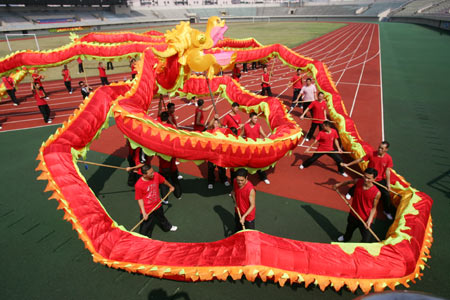|
As the clock ticks inexorably toward tonight's grand gala in Tian'anmen Square, dragon dancer Cai Mingchan says he has to take deep breaths periodically in order to contain his growing excitement.
Cai will lead the Tongliang dragon dance scheduled for tonight's National Day celebration.
He helped choreograph and direct the performance and has been listening to drum beats several hours a day during the past four months as he and his team of more than 100 prepared for the traditional celebratory act.

The dragon dance from Tongliang County in Chongqing in the southwest will be performed at Thursday's National Day gala in Tian'anmen Square, October 1, 2009. [China Daily]
The dragon has evolved from a symbol of deity, the emperor and imperial power into an icon of the Chinese nation over the course of 2,000 years. The dragon dance, which usually features a dragon chasing a pearl to symbolize Chinese people seeking happiness, has become an indispensable part of the country's various festive celebrations.
"I have heard so much beating of drums that my head now echoes to their sound," said 31-year-old Cai, who will carry the pearl prop to lead the dragon tonight. "I just can't wait."
The dragon dance from Tongliang County in Chongqing municipality in the southwest, Cai's hometown, is famous across the world for its fast moves and colorful props.
Traditional as it is, the dragon dance has been evolving over time, said Cai, who has been staging dragon dances since he was a boy of 16.
"There are always big innovations involved when it is specially designed for a major occasion," said Cai, who participated in the celebration gala for the 50th anniversary of the National Day in 1999 and last year's Beijing Olympics.
For example, this time the dragon is going to be of an historic length of 100 m, compared with the 50 m for the 50th anniversary and the 60 m for last year's Olympics, said Cai. According to Chinese belief, the longer the dragon, the more luck it will bring to the community.
"We want the best for our country," said Cai.
But the longer the dragon, the heavier it is, requiring more performers and more strength to make fast moves, especially when it is windy, which is the norm at night at this time of the year in Beijing, said Cai.
However, that has never been Cai's major concern as the team has rehearsed in windy conditions several times so as to get used to the dragon's bigger size, he said.
"For the first time, you will see we transform the dragon's color from golden yellow to red in the blink of an eye," said Cai with a wink.
Cai said they designed the stunt for the Beijing Olympics but had to drop it because it was too difficult to perform.
"A total of 112 performers have to act fast enough and simultaneously to make it happen," explained Cai.
That requires good coordination, usually taking the lead from the pearl carrier.
"That's why it is so important for me to remember every beat and its associated move," said Cai. "But don't worry. I guarantee you'll see a stunning act tonight."
Editor: Liu Fang
|
